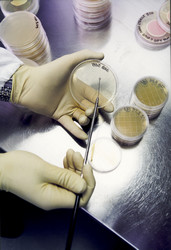Achieving efficiency and accuracy in GM food risk assessments
Researchers funded through the GRACE project recently conducted a 90-day feeding trial on rats to assess the safety of two different varieties of genetically modified (GM) MON810 maize. In the trial, control groups were given the non-GM parent variety or one of four conventional maize varieties as part of their diet. The results showed that the two GM maize varieties tested did not trigger any negative effects in the trial animals. The purpose of the study was not only to assess the safety of the GM food, but also to assess the effectiveness and accuracy of the 90-day trial. Conclusions concerning the potential scientific value of these trials – for the purpose of conducting risk assessments on GM food – will be drawn only after a one-year feeding study is complete, towards the end of the project in 2015. These initial findings are highly topical. The European Parliament’s Environment Committee recently voted in favour of allowing Member States to ban the cultivation of GM crops on their own soil, even if the crops in question have been approved at the EU level. Genetically modified organisms (GMOs) are plants and animals whose genetic characteristics have been artificially modified. EU legislation foresees that no GMO can be cultivated in the EU if it has not received a prior authorisation, following a risk assessment which involves the national evaluation agencies and the European Food Safety Authority (EFSA). Only one GM maize – the MON 810 used in the trial – is currently commercially cultivated in the EU. There have been calls to improve the efficiency of the risk assessment phase, which can take years. A key question however is whether a quicker testing method – such as the 90-day feeding trial conducted by GRACE researchers – can reliably identify the medium- and long-term health impacts of eating GM crops. This is what the project aims to find out. To this end, GRACE, which has received EUR 6 million in EU funding, is pursuing two key research objectives. Firstly, it aims to review evidence on the health, environmental and socio-economic impacts of GM crops, considering both risks and possible benefits. These reviews will be conducted in a systematic, transparent and inclusive way, and the results made accessible to the public via an open access database. Secondly, GRACE is testing various types of animal feeding trials and alternative in vitro methods (e.g. in test tubes) in order to determine their suitability. The European Commission is considering whether 90-day feeding trials should be a mandatory test method for the risk assessment of GM foods and feeds. The recent GRACE project study will therefore provide valuable scientific input to help the Commission reach a conclusion. The project runs from July 2012 to November 2015, and involves some 18 research institutions from 13 countries. For further information, please visit: GRACE http://www.grace-fp7.eu/
Countries
Germany



